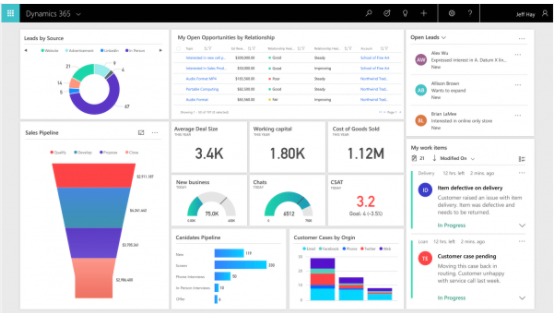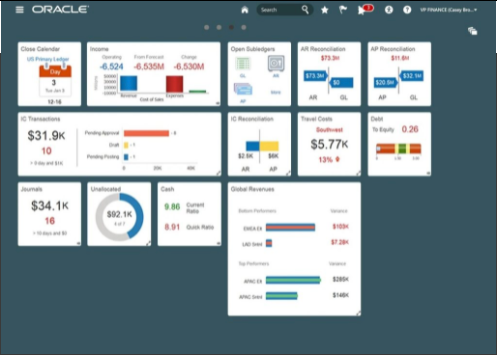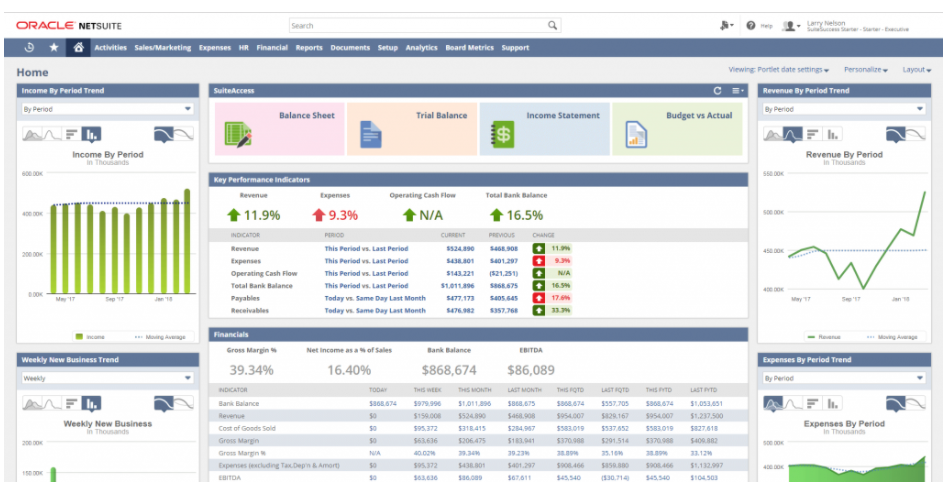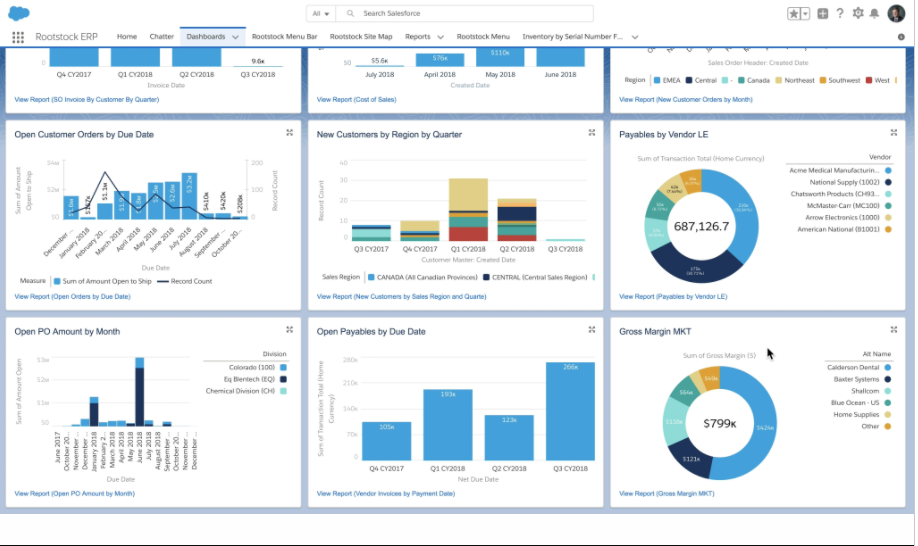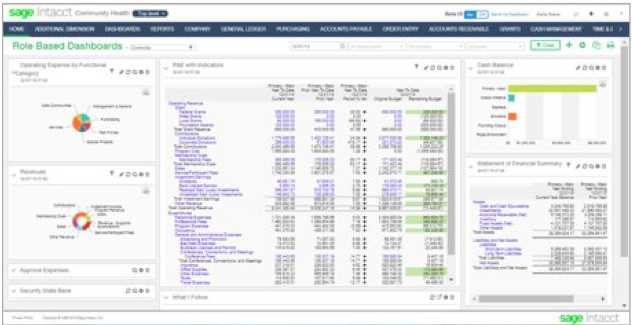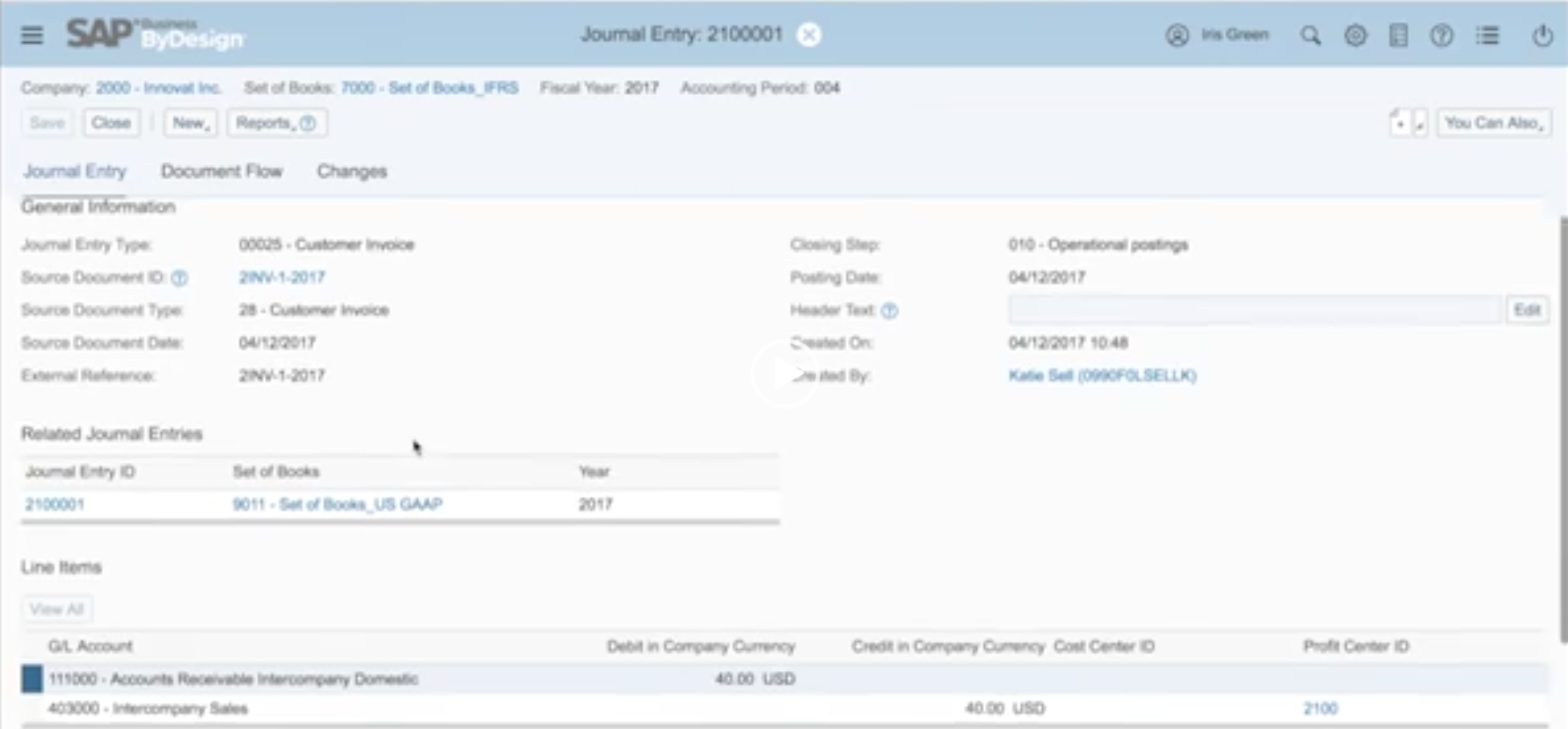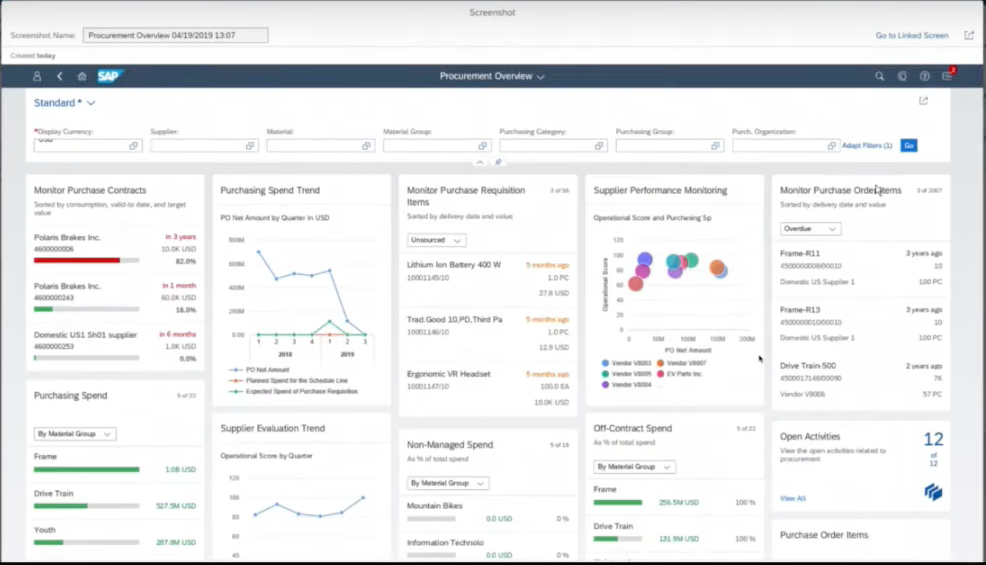
Implementing the ideal healthcare ERP (enterprise resource planning) solution is important across healthcare industry operations, regardless of the other challenges they face in size and specialty.
In fact, all healthcare businesses face one common challenge: finding patient and employee management tools that enhance their abilities to provide quality care while avoiding unnecessary cost, risk, or inefficiencies. An increasing number of healthcare organizations are finding that healthcare ERP software helps them to meet this operational challenge head-on.
Read more: How to Choose a Healthcare ERP System
The Best Healthcare ERP Solutions Compared
Healthcare enterprise resource planning (ERP) software addresses healthcare managers’ unique requirements to provide the best medical service to their patients. ERP software helps organizations manage day-to-day business operations such as accounting, procurement, project management, risk and compliance management, and supply operations.
Below are some of the best Healthcare ERP solutions available, along with their key or unique features.
| Vendor | Management | Management | Management | Management | Management | and Analytics |
|---|---|---|---|---|---|---|
| Microsoft Dynamics 365 | ||||||
| Oracle Fusion Cloud ERP | ||||||
| Oracle Netsuite ERP | ||||||
| Rootstock Cloud ERP | ||||||
| Sage Intacct | ||||||
| SAP Business ByDesign | ||||||
| SAP S/4HANA |
Microsoft Dynamics 365
Microsoft Dynamics is reviewed as a comprehensive ERP solution to help the healthcare industry meet daily operational objectives. Microsoft’s ERP software is complimented for its user-friendly interface.
The workflows to complete tasks, as well as the report generation features, received high praise from customers. Tracking a transaction to completion and performing searches multiple ways also provide users a positive experience with this software package.
On the other hand, customers complained that some of the error messages were not easy to understand. Some customers also noted a lack of customization, and the automatic invoicing feature seems underdeveloped.
Oracle Fusion Cloud ERP
Oracle’s Fusion Cloud ERP product offers a powerful BI module to help businesses identify trends and analyze complex datasets. The Oracle product allows businesses to analyze and monitor an ongoing transaction through to completion.
Oracle offers unique modules that cater to industry-specific needs. Customers like Oracle’s ability to operate all business functions from one platform. For customers that like this Oracle product, the price is considered reasonable.
Based on customer reviews, Oracle’s error messages are not clear, and customers must search for the specific field with the incorrect information before continuing. Moreover, the Oracle Fusion Cloud ERP application can be buggy or run very slow, according to reviewers.
One customer noted that the project management module is less than satisfactory, and managing multiple projects cannot be accomplished. Several customers also stated that customer service is poor.
Oracle Netsuite ERP
Oracle Netsuite has a comprehensive list of features that can aid any industry-specific business in accomplishing its daily operational activities. This Oracle product can integrate with any third-party application, and several customers praised how easy it is to customize the product to meet unique needs.
In addition, the ERP, customer relationship management (CRM), and eCommerce features are given high praise by customers.
A constant complaint among reviews was that the learning curve is steep, and it takes time to become familiar with all the features of Oracle Netsuite. Some customers also consider the pricing to be very high; the more features a company adds, the costlier Oracle becomes. The error messages are not easy to decipher, and one customer claimed they needed to Google error messages to correct them.
Overall, Oracle Netsuite can meet many industry-specific business needs, despite some noted issues.
Rootstock Cloud ERP
Rootstock has a user-friendly interface and a helpful customer support staff, which one customer rated at five out of five. Another reviewer also appreciated the improvement of the customization features of Rootstock, and the project management feature has received compliments from several customers. Rootstock also purportedly works well with Salesforce.
Though the customer service has been reviewed as excellent, some customers complain that when problems are corrected, they are not notified. Rootstock is reported as being a resource hog, so the product can be slow at times. Moreover, customer documentation needs to be developed with more details on executing certain functions. End-user training also needs to be updated and expanded to ensure all processes are understood.
Sage Intacct
Several customers raved about Sage Intacct’s integration capabilities with other software products. The database contains all the required information to check approval statuses, invoices, and payment progress.
All the accounting modules received compliments on their ease of use. Customers also like the financial information Sage Intacct provides, as it allows managers to make an informed decision based on accessible and current data.
Sage Intacct is considered costly for smaller companies, even though they like the product. Application-wise, some of the functionality drawbacks include difficulty in writing reports and editing transactions, as well as general ledger modules not being as robust as some of the other financial features.
Some reviews commented on the application’s clunky operation, and noted their difficulty maneuvering around the application. Overall, customers reviews either praised the application, or only had specific issues with one or two aspects of this healthcare ERP product.
SAP Business ByDesign
SAP Business ByDesign is touted as a reliable and easy-to-learn ERP system, with easy accessibility and document flow design from module to module. Many ByDesign features are configured to work out of the box for midsize companies, and SAP is also ideal for international companies.
The relationship map and the query generator are unique features customers particularly like. Overall, customer reviews are mostly favorable for this product.
Some customers noted minor back-end database issues, while others think the application lacks proper user training. In addition, this version of SAP does not have some of the modules or features presented in other SAP products. Another common complaint was how long it took companies to learn all the functions to perform daily operations.
SAP S/4HANA
Customers like SAP S/4HANA’s flexibility and the ability to trace and reverse any transaction. This ERP solution features built-in artificial intelligence to provide advanced analytics. The reporting capabilities are easy to use, and the audit features make it easy to execute audit trails. Customer support is also rated highly.
Several customers said this platform is costly, and the learning curve is steep. Setting up the production application is an extensive process, and customization can be expensive. The application is noted for running very slow, which can cause a server to reboot without saving user data. The user interface also lacks the modern-day aesthetics presented in many comparable applications.
Why Choose a Healthcare ERP Over Other Solutions?
The right healthcare ERP software application provides a technological backbone that automates workflows across existing software and databases, also enabling cross-departmental reporting, tracking, and data analytics.
While you always have the option to build your own or adapt the features of a general-use ERP, the better option is a healthcare-specific ERP solution. These industry-specific platforms already include the connectivity and cross-analytics that hospitals and other healthcare systems need for efficient data processing.
Even if a prebuilt healthcare ERP platform doesn’t have all of the features your organization needs, starting from the baseline of a healthcare-focused platform offers you a simpler and more affordable process for adding on only a few specialty field-specific features.
Read more: Why Healthcare Risk Management Is Important
What Are Key Features of Healthcare ERP Solutions?
When deciding to implement or expand an ERP platform into a healthcare setting, what key factors should CIOs and other executives keep in mind? Your evaluation team should consider these four features in their search for a healthcare ERP platform.
Eliminates Repetitive Data Entry and Coding Errors
Many smaller healthcare organizations employ several staff dedicated to the repetitive and error-prone task of data entry, which often results in duplicated efforts across patient and client management tools.
A strong healthcare ERP addresses the lost time, lost money, and human error that comes with repeated data entry across scheduling software, billing and reimbursement software, and CRMs. The right tool increases accuracy and efficiency by sourcing universally needed data sets from the ERP hub and channeling them to other software in the network.
Healthcare organizations of all sizes face similar data entry silos and often try to solve the inefficiencies with custom dev API connections across their network. If your organization spends extensive time and financial resources on managing API connectivity, you may find that a central healthcare ERP solution better organizes these connections, requiring less frequent and specialized maintenance down the road.
Manages Growing and Diversifying Supply Chain Processes
The COVID pandemic brought into sharp focus the need to accurately integrate supply chain visibility and care delivery.
The combined use of N95 masks across acute healthcare organizations usually averages around 25 million per year, but in the first half of 2020 alone, that group used more than 300 million of the same N95 masks.
This example shows that many healthcare organizations already maintained and distributed large supplies of medical equipment before the COVID-19 pandemic, but most had never dealt with the supply, demand, scarcity, and urgency that the pandemic brought on.
With a larger and more diverse collection of medical items to track and distribute, healthcare companies need to find ERP options that accurately and efficiently connect their supply chain process to vendor invoicing, and the specific needs of all of their facility locations.
Robust Employee and Patient Management
State and federal regulations change frequently in the healthcare industry via the Department of Health and Human Services and the Department of Labor, not to mention changing recommendations from organizations like WHO, CDC, and VA.
Falling out of compliance with certain changes may result in only minor problems or fines for the organization. Other missteps, like a Tier 4 HIPAA violation, could result in fines as high as $1.5 million or revoked licenses.
With a healthcare ERP application designed to track compliance measures internal and external to the organization, your hospital or facility can automate the process of avoiding compliance violations. For healthcare-specific compliance features, you should look for:
- An ERP that will easily adjust to new information about regulatory changes across the platform’s tools, and use AI to monitor changing regulations on state and federal websites.
- An ERP with strong security protocols to protect PHI and avoid data breaches that lead to HIPAA violations.
- An ERP that transmits accurate employment and medical history/PHI data across databases, working to avoid human error.
- An ERP that can handle the growth in telehealth data and the needed cloud-based security to offer those virtual services.
Predictive Analytics and AI for Patient Quality Assurance
Predictive analytics has expanded in healthcare operations, allowing healthcare providers to assess several risk factors that could lead to a critical, life-threatening incident for a patient.
Your healthcare ERP platform should not only be able to keep up with these insights into patient health, but should be able to use that data to inform other decisions. Consider the following scenarios:
- If predictive analytics in your scheduling software indicate that several of your Alzheimer’s and dementia patients are high hospitalization risks, your healthcare ERP program can connect data from patient EMRs with employee profiles in your HRMS and/or LMS, helping you to quickly determine which employees have the appropriate training to provide specialized dementia care to these patients.
- If a patient has been hospitalized a certain number of times in a given period, your predictive analytics can indicate that they are high-risk, alerting your team to make care plan adjustments in your scheduling or care management software.
- If several critical incidents or health scares have occurred under the care of a particular employee, your predictive analytics may indicate that they are a high-risk employee in need of further training or termination.
- If one of your facilities has historically gone through N95 and surgical masks at a quicker rate than others, predictive analytics can indicate that you need to increase the order quantity, frequency, or distribution of those items. This will ensure that your patients in that area never receive care from a staff member working with a lack of PPE.
Whether healthcare predictive analytics are native to your chosen ERP or live in another one of your company’s applications, well-informed care and training decisions come from ERP platforms that incorporate predictive analytics.
Read more: How Is Predictive Analytics Used in Healthcare?
Healthcare ERPs Need Elasticity
Gartner predicted that by the end of 2021 “demands for product/service adaptability and agility will position elasticity as a top three criteria for more than 75% of enterprise technology and services purchases.”
Nowhere is elasticity more important than in healthcare technology, especially as state and federal regulations for care change over time. Constantly fluctuating reimbursement rates and regulations require software and systems to keep up without losing their accuracy or increasing the time spent on single-point data entry.
Across the board, the healthcare industry has suffered from many inefficiencies in technical procedures and sophistication for years, leading to operations with data that is less accurate, more vulnerable to security breaches, and generally less insightful regarding cross-application information.
The COVID-19 pandemic exposed these vulnerabilities to the world, showing that things like increased PPE supply chain management and medical practitioners providing widely available (and secure) telehealth were not wholly accounted for until they were necessary.
Healthcare ERP systems are purpose-built to alleviate these new operational headaches, helping your staff achieve a smoother workflow with more efficient work, fewer mistakes, less lost revenue, and more predictability. With a healthcare ERP platform, your organization has the infrastructure in place to meet ongoing and new operational challenges.
